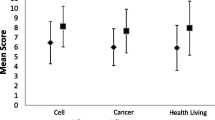Abstract
In 2006, St. Jude Children’s Research Hospital began developing a school-based outreach program known as the St. Jude Cancer Education for Children Program (SJCECP). The program aimed to teach children about cancer and healthy habits that can prevent the formation of cancers into adulthood. During the 2010–2011 academic years, we conducted a pilot evaluation of the SJCECP curriculum, with the primary objective of evaluating the impact of the intervention on knowledge acquisition and retention among 4th-grade students participating in the program. Seven local schools and 481 students from the Memphis area participated in the program evaluation. The results of this study show that 4th-grade students are able to acquire gains in knowledge related to cells, cancer, and healthy living after receiving the SJCECP intervention. We conclude that the program can be a useful tool for improving knowledge of cancer concepts at the 4th-grade level.

Similar content being viewed by others
References
American Cancer Society (2014) Cancer Facts & Figures. 2014. Atlanta: American Cancer Society. http://www.cancer.org/acs/groups/content/@research/documents/webcontent/acspc-042151.pdf. Accessed 14 Oct 2014
Ogden C, Carroll M, Kit B, Flegal K (2014) Prevalence of childhood and adult obesity in the United States, 2011–2012. JAMA 311(8):806–814
National Association for Sport and Physical Education (1999) The Fitness Equation: Physical Activity + Balanced Diet = Fit Kids. Reston, VA: National Association for Sport and Physical Education
U.S. Department of Health and Human Services (2014) The Health Consequences of Smoking—50 Years of Progress: A Report of the Surgeon General. Atlanta: U.S. Department of Health and Human Services, Centers for Disease Control and Prevention, National Center for Chronic Disease Prevention and Health Promotion, Office on Smoking and Health. http://www.cdc.gov/tobacco/data_statistics/sgr/50th-anniversary/index.htm. Accessed 14 Oct 2014
U.S. Department of Agriculture and U.S. Department of Health and Human Services (2010) Dietary Guidelines for Americans, 2010. 7th Edition, Washington, DC: U.S. Government Printing Office. http://www.cnpp.usda.gov/dietaryguidelines.htm. Accessed 14 Oct 2014
Haverkos L (2010) Pediatric behavior and health promotion research program. Washington, DC: National Institutes of Health. http://www.nichd.nih.gov/about/org/crmc/cdb/prog_pbhp/index.cfm. Accessed 14 Oct 2014
Center for Disease Control (2012) School Health Policies and Practices Study 2012. National Center for HIV/AIDS, Viral Hepatitis, STD, and TB Prevention, Division of Adolescent and School Health and National Center for Chronic Disease Prevention and Health Promotion, Division of Population Health. http://www.cdc.gov/healthyyouth/shpps/2012/pdf/shpps-results_2012.pdf. Accessed 14 Oct 2014
Center for Disease Control (2006) School Health Policies and Practices Study 2006. National Center for HIV/AIDS, Viral Hepatitis, STD, and TB Prevention, Division of Adolescent and School Health and National Center for Chronic Disease Prevention and Health Promotion, Division of Population Health. http://www.cdc.gov/healthyyouth/shpps/2006/factsheets/pdf/FS_HealthEducation_SHPPS2006.pdf. Accessed 14 Oct 2014
The National Academies Press (1996) National Science Education Standards. Washington, DC: The National Academies Press. http://www.nap.edu/openbook.php?record_id=4962. Accessed 14 Oct 2014
The Joint Committee on National Health Education Standards. National Health Education Standards: Achieving Excellence (2nd Edition). Atlanta: American Cancer Society, 2007
National Association for Sport and Physical Education (2004) Moving into the Future: National Standards for Physical Education (2nd Edition).Reston, VA: Author. http://physedteacher.home.comcast.net/~physedteacher/NatAcadStanPE.pdf. Accessed 14 Oct 2014
Quintana Y, Villalobos A, Ribeiro RC (2012) Cure4Kids for Kids: Preliminary Results on Evaluating Knowledge Acquisition and Knowledge Retention. In: Advancing Cancer Education and Healthy Living in Our Communities: Putting Visions and Innovations into Action. Stud Health Technol Inform Volume 172. IOS Press
Davis LL (1992) Instrument review: getting the most from a panel of experts. Appl Nursing Res 5(4):194–197
Acknowledgments
We thank the St. Jude Children’s Research Hospital International Outreach Program. This study was funded by the American Lebanese and Syrian Associated Charities (ALSAC) of St. Jude Children’s Research Hospital.
Conflict of Interest
The authors declare that they have no conflicts of interest.
Author information
Authors and Affiliations
Corresponding author
Rights and permissions
About this article
Cite this article
Ayers, K., Villalobos, A.V.K., Li, Z. et al. The St. Jude Cancer Education for Children Program Pilot Study: Determining the Knowledge Acquisition and Retention of 4th-Grade Students. J Canc Educ 31, 26–30 (2016). https://doi.org/10.1007/s13187-014-0752-5
Published:
Issue Date:
DOI: https://doi.org/10.1007/s13187-014-0752-5




